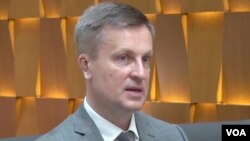Ukraine’s former intelligence chief says Russia is financing and organizing training camps from within Ukraine’s rebel-controlled eastern provinces in order to destabilize the country.
“Up to 30 camps in Donetsk, Luhansk and Crimea are training subversive groups, providing them with weapons and sending them on missions throughout Ukraine,” said Valentyn Nalyvaichenko, who ran the Ukrainian Security Service (SBU), the country’s successor to the Soviet-era KGB, until his forced resignation last month.
“Local criminal gangs and separatists, together with Russian active duty troops, are all committing war crimes and violating international law inside Ukraine,” Nalyvaichenko said. “That’s what we mean by Russian aggression.”
VOA’s attempts Friday to solicit a response to the allegations from the Russian embassy in Washington were unsuccessful.
Ukraine split
Nalyvaichenko’s comments come as a former high-ranking U.S. official said the Minsk accords – a cease-fire deal negotiated in February – had effectively split Ukraine in two.
“This is a partition of Ukraine, imposed by France, Germany and Russia, where you have an eastern part run by separatists, [to which] Ukrainian authorities are forbidden to go – and this division is overseen by the OSCE,” said Kurt Volker, who served as U.S. ambassador to NATO under George W. Bush.
“Russia will continue, piecemeal, to push buttons inside Ukraine,” Volker said Friday.
He predicted that Russia could step up its military activities in Ukraine.
“The Russians could try to take more territory in the corridor connecting eastern Ukraine to Crimea through Mariupol,” Volker said.
Threat reduced
But Nalyvaichenko played down the danger of Ukraine’s disintegration, saying the threat is much reduced from a year ago.
Nalyvaichenko said his former agency – like the country as a whole – has moved substantially since the Maidan Revolution deposed former pro-Russian president Viktor Yanukovych in February 2014.
“I remember the night I was appointed to head the SBU, just after Maidan. The building was empty, the agency’s former leadership had all fled to Russia or Crimea. There were no operative files, no weapons. Institutionally, the place was totally destroyed,” Nalyvaichenko said.
The former Ukrainian spy chief said his main challenge had been to weed out Russian infiltration throughout the government, but especially within Ukraine’s law enforcement and security services.
“There’s no longer a total infiltration of Russian agents. The danger is no longer widespread,” he said.
Nalyvaichenko said Ukrainian authorities, at the end of his tenure, arrested a pair of Russian military intelligence officers who have provided a bonanza of information about a special battalion from Russia’s GRU, or military intelligence directorate.
“For that brigade alone, we got the names, ranks, positions and orders for 220 people who invaded Ukraine in May,” Nalyvaichenko said.
Key security issues
The former intelligence chief, who acknowledged he “was fired” last month for allegedly refusing to reign in an anti-corruption campaign, said Ukraine faces two main national security issues.
“First, we need to provide constitutional guarantees for free and fair elections in Donesk and Luhansk,” Nalyvaichenko said. “[The people there] never had that opportunity. All the election commissions [in those areas] were corrupt and people were told whom to vote for.”
“Second, we need to beef up regional budgets to resettle the 1.42 million internally displaced people who were forcibly removed and expelled from [eastern Ukraine],” he said.
Aliona Shkrum, a Ukrainian parliamentarian from former Prime Minister Yulia Tymoshenko’s “Fatherland” party, agreed that resettling the country’s massive refugee population “is one of the keys to Ukraine’s stability.”
Ukraine's internal refugee crisis is one of the largest in post-World War Two Europe.





